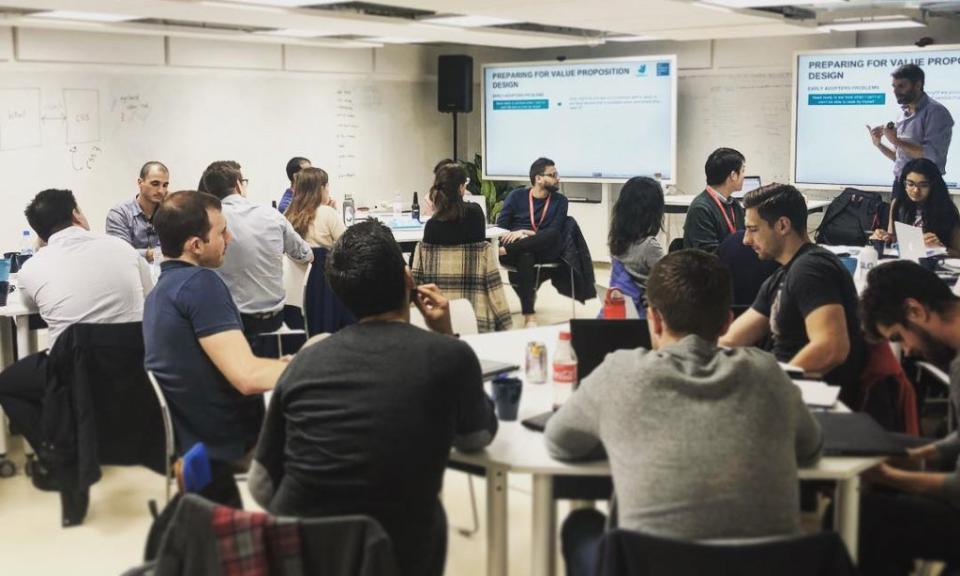Time to start your online pre-study modules?
You may be wondering how you will acclimatise to the academic standards of an Imperial Business School programme. Before the programme begins, you must complete a series of online pre-study modules. This will help to ease your transition.
The Hub
You will find all pre-study modules as well as information and documents relating to your programme, (such as timetables, programme materials and past exam papers) on The Hub: the Business School’s virtual learning environment.
The Hub has been purpose-built to give you access to the information you need and keep you connected. You will receive regular communication about important careers events, social events and volunteering opportunities. It’s a great way to stay in the loop with all that’s going on at the Business School!
When you log into The Hub, you’ll see an instructional video, guiding you through the areas of The Hub.
Before you can access the Hub, you will need to activate your ICT account. Instructions of how to do this will be emailed to you very shortly, if they have not been sent already. We will contact admitted students via email when they are able to access modules on the Hub.
If you have been contacted about Hub access but experience problems with your Hub account, please contact thehub@imperial.ac.uk.
Pre-Study programme modules
We release programme specific modules throughout the summer. You will receive detailed information regarding the module requirements from your relevant Admissions team. Assessment methods vary between programmes and can be a combination of online quizzes, tests and evidence of the completion of modules. We design these modules to give you a basic knowledge of areas which will be covered in the programme.
Top tip: please give yourself plenty of time to complete the modules!
Your first month at the Business School will be extremely busy, so it is advisable to complete these modules before you commence the programme. Some of the programme modules can take longer than others to study depending on your familiarity with the topics and previous experiences, such as the Accounting Primer, which can take between approximately 15-20 hours to complete. You will find that you benefit more from the experience if you are able to work through the material at a steady pace and give yourself time to become comfortable with the content.
Pre-Study Careers modules
Lisa Umenyiora, Executive Director of Careers & Student Life at the Business School:
Get career ready! Did you know most of your target employers typically open for applications in August? Get a head start on your career today with our Careers Primer on The Hub. The Careers team have designed a Careers Primer that will help you to be prepared for the Careers opportunities available to you throughout your time at Imperial – over five thousand students have completed the Careers Primer over the last six years and now it’s your chance to join them.
The Careers Primer has been designed for Imperial Business School’s students to fulfil career ambitions, produce a class leading CV, Cover Letter and to give you an edge in Interviews and Assessment Centres.
Updated for the 2021-22 cohort, this key resource is available to Admitted Students four months before you start on your programme in September. Admitted Students can take advantage of priority access to this significant resource, giving you a crucial head start in the early applications round that occurs before the September start. It is strongly recommended that you complete this before you arrive to ensure you are ready for early employer engagement.
The Careers pre-study modules include Foundations for Careers Success, which will help you develop your sector knowledge, career strategy, understand how to effectively market yourself and ultimately find a career that is right for you.
You’ll also have the opportunity to undertake a Writing Your CV & Cover Letter module. Once completed, you will gain access to VMock, our CV Enhancement Platform. VMock uses machine learning and artificial intelligence to assess your CV and make suggestions for how it could be improved.
Symplicity
Once you have worked through the Careers Modules, you’ll be able to access Symplicity, our Careers Management System. Symplicity can be used to book one-to-one career appointments, employer events and workshops. You will be able to log in to Symplicity using the same log in credentials you use for the Hub. All the main employers will visit Symplicity to post job advertisements. The Careers team will approve all the jobs posted on Symplicity, so you can trust the opportunities that you see advertised. There’s no limit to when you use Symplicity – you will be able to access information about graduate jobs after your course has finished and beyond!
Top tip: Make sure you fill in your personal profile on Symplicity, as this is key to ensuring your profile appears in searches!
We hope you enjoy this first stage of your study with the Business School. We look forward to welcoming you on onto the programme soon!












